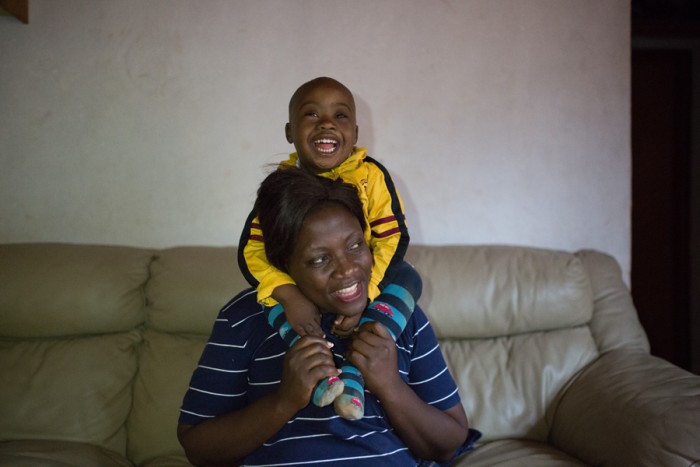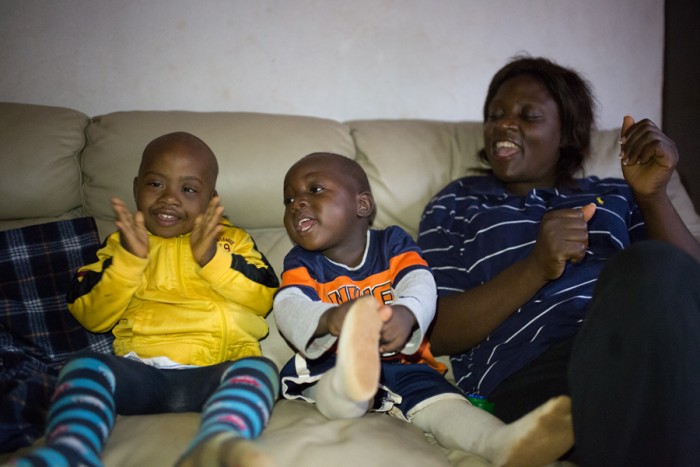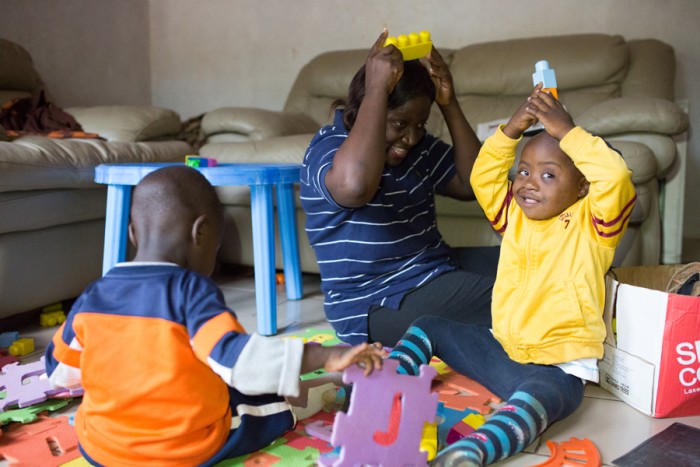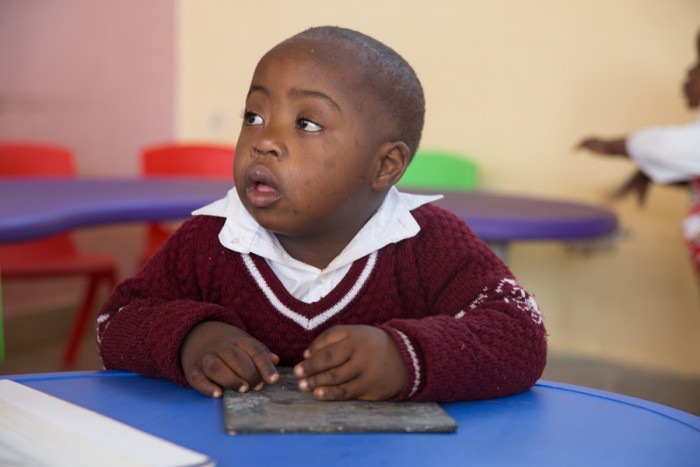May 12th, 2016 by Rachel | Tags: Disability, Peace Corps, Persons with Disabilities of Cameroon, Photography | 4 Comments »
During the last seven months of my Peace Corps service, I am featuring photographs and stories of several persons with disabilities living in Cameroon. All the photos are part of a series called “Persons with Disabilities of Cameroon.” The goal of presenting photographs and their stories is to create better awareness about the plights that persons with disabilities face in a developing country. When I return to the US, I hope to exhibit this series in a gallery and publish a book to educate others about persons with disabilities living in developing countries as this topic is so rarely discussed in the media.
Antonia, a Cameroonian, was living in Tunis, Tunisia, in 2011 working as a personal assistant for a diplomat of African Development Bank. At 10 to 12 weeks pregnancy, she learned through ultrasound that her unborn child had Down Syndrome. If she was in Cameroon, she would never have known that she was pregnant with a child with Down Syndrome. Ultrasounds do not exist except in the two largest cities, Douala and Yaounde, and they are available only to pregnant women who are wealthy and have the financial means to pay for them. Most women in Cameroon never even know the gender of their child until the baby is born.
Abortion was presented to Antonia as an option. She was counseled. She was presented with information about the challenges of raising a child with Down Syndrome. She was encouraged to have an abortion. She said “No” to abortion because she was already aware of Down Syndrome. She first met a 14 year old girl in Cameroon with Down Syndrome who was raped repeatedly by a neighbor who then died from being raped in the late 1990’s in Bamenda. She saw a 3 year old girl with Down Syndrome, who was abandoned in a stream and died in the early 1990’s in Mamfe, a village near Bamenda where she grew up. She said that this is a village tradition that has been practiced in many parts of Cameroon. They believe that children with Down Syndrome are snakes.
Two years before she was pregnant, she met a girl with Down Syndrome in a church in Tunisia who was from the U.S. She was attending the church with a friend from the US who was a medical student there . When she saw the girl with Down Syndrome, she said to her friend, “She looks like one of those funny children in Cameroon.” The medical student said “No, it’s Down Syndrome.”
“After church, she taught me about Down Syndrome. She educated me on the chromosome 21 replication. So, I now knew what Down Syndrome was and two years later I was pregnant with my first son and with diagnosis of chromosome 21 in testing. ”
When I asked her if she immediately knew that she wanted to keep the baby when she found out that he has Down Syndrome, she said, “At first I cried. I had so many questions. Why me? I went back to the children in Cameroon. Then the success stories coming from the U.S. It was then I decided to keep my boy.”
When she found out about her son, Aidriking, she called her friend who was a medical student from the U.S. and told her the news. “She encouraged me to be strong and everything will be fine,” said Antonia. She gave her information about Buddy Works, an association for people with Down Syndrome. She called the organization and they promised to send her a support kit, but she never received it. She looked up more information about Down Syndrome on the internet all while she was pregnant.
When Aidriking was born, in December 2011 in Tunis, he had a heart defect. He had laser heart surgery at 2 months which was not effective, and so he had to have open heart surgery. The cost of open heart surgery in Tunisia was more than she could afford, and so she had to return with him to Cameroon for that surgery, which he had at age 11 months.

Antonia shares her strong love for her son, Aidriking.
“From there, I decided to start advocating for other children with Down Syndrome because there were a lot of ignorance and a lot of cultural malpractices of these children. So, I decided to tell my story and use my son as an example to show love and care for these children. I think it’s not easy advocating and changing the perception that the society already has about children living with Down Syndrome. So my wish is to open an educational center to train and a home to accommodate because most children with Down Syndrome live on the streets. I’d like for the center to be a school to bring children with Down Syndrome and children without disabilities together. The goal is to provide a mainstream school for children with Down Syndrome,” said Antonia.
She would like to train children with Down Syndrome on life skills. As children with Down Syndrome get older, those who can’t continue in mainstream schools will to move vocational training. Those who can continue their education will stay mainstreamed with children without disabilities.
Aidriking was enrolled in the best private preschool in the city of Bamenda in September 2015. He was sent out of the school on the 10th of February, 2016. She received a letter saying that her son could no longer attend the school because other parents were not comfortable with their children being in the same classroom as her son.
Starting a school has always been an idea but since when Aidriking was sent out, Anotnia has been more motivated to start the center.
When she was pregnant with Aidriking, Antonia also started thinking about creating a foundation for children with Down Syndrome in Cameroon. She had the option to stay in Tunisia but decided to move back to Cameroon. The foundation, Aidriking’s Foundation, became a reality in 2014. “I went on national television for the first time in Cameroon. It was the first time information about Down Syndrome was on television in Cameroon, ” said Antonia.
After her appearance on television, Antonia received over 200 phone calls and text messages from parents of children with Down Syndrome. They were very happy to have more information. Children with Down Syndrome and their families then visited her home to learn more.
In December 2015, Anotnia held the first fundraiser for the foundation. On March 21st, the foundation celebrated World Down Syndrome Day for the first time.
She is now forming a support group for families with children with Down syndrome. She found another school that agreed to take Adriking and he started there in mid-April 2016.
Antonia still faces stigma in the community where some residents are still of the mindset that witchcraft is behind children with Down Syndrome. They tell her that there is a curse in the family, and there is something wrong with the family. They tell her that “He is not a normal child and he’s a snake.” She responds by saying, “I still love my son like any other child like he is the best. Like he’s a king.”
Other parents of children with Down Syndrome have copied her example, and they all fight together now to change the misguided perception of members of their community.

Antonia sings a song with her sons.



4 Comments
antonia bih
May 13, 2016 at 9:13 am
Whaoo!! Rachel, thanks for being part of this race with all persons living with Down SYndrome and especially my first son Aidriking.It has not been easy but slowing and steadily will will get somewere
Facebook.com/CANAbilities
May 13, 2016 at 4:05 pm
I am so touched by your story. Being the parent of a child with Autism and other disabilities. .I understand exactly what you are going through. Good luck in raising awareness about Down Syndrome and I hope that someday we will join together and make Cameroon a Disability Awareness country.
Rene Momene
May 14, 2016 at 6:08 am
This is quite interesting Rachel. I am the CEO of MORE ACTION FOR DISABILITY INCLUSION, an NGO working to promote disability inclusion in Cameroon. Currently, I am still in the USA as a trainee on services for persons with disabilities. Contact me via email and let’s see how we can start working on this down syndrome issues in Cameroon.
Esther Ashu
June 12, 2016 at 5:51 pm
Hi, I am very motivated by your story. I am a school administrator and teacher of a private elementary school in Cameroon. I work closely with some of our school kids with special challenges such as autism. We face the challenge of lack of teaching resources and trained personel to deal with these challenges.